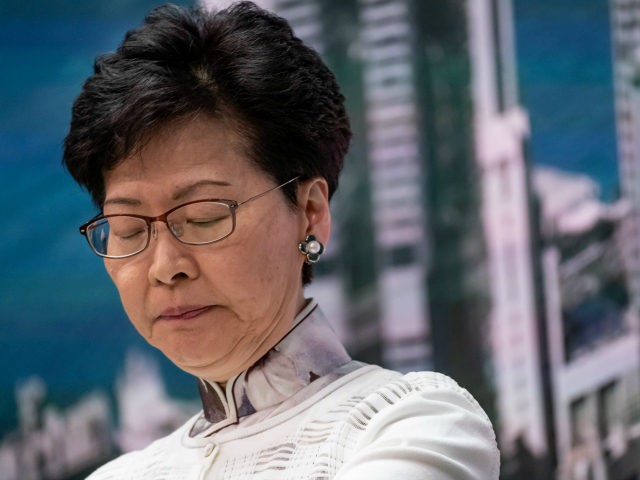Hong Kong chief executive Carrie Lam attempted to convince pro-democracy protesters on Tuesday to give up their cause, insisting the extradition bill that brought millions to the streets against it “is dead” and that she is aware that the plan to roll it out was a “total failure.”
Opposition leaders made clear that they did not accept her explanation, as Lam pointedly refused to use the proper legislative language of “withdrawing” the bill from consideration and insisted on prosecuting protesters for speaking out against the bill.
Hong Kong’s Legislative Council (LegCo), the chief lawmaking body of the city, introduced a bill this year that would have allowed China to extradite anyone in the city, Chinese citizen or not, into Communist Party territory if Beijing claims that the individual has violated Chinese law. Chinese law bans most free expression, including the freedoms of public speech and the press, leading many to fear they could be forced to languish in a Chinese prison for criticizing the Communist regime in the presumed free city of Hong Kong.
Millions of Hong Kong residents have taken to the streets since early June, when the anniversary of the Tiananmen Square massacre brought out thousands against China. In the most dramatic protest to date, opponents to the bill destroyed the LegCo building, making it impossible for lawmakers to meet and pass the bill. The protesters were careful to destroy only the rooms and equipment necessary for lawmaking, leaving untouched historical artifacts and leaving money in the cafeteria for drinks they took during the protest.
The government of China, which technically oversees an autonomous Hong Kong, has called the protests “riots” and condemned the international community for coming out in support of the anti-China movement.
“This time, I don’t think we can continue to ignore those fundamental and deep-seated problems in Hong Kong society. I hope together with Hong Kong community, we can go deep into those issues,” Lam said during a press conference Tuesday.
“There are still lingering doubts about the government’s sincerity or worries whether the government will restart the process in the Legislative Council, so I reiterate here, there is no such plan. The bill is dead,” she continued.
“People do not have to worry that we should use some means to discuss this bill again within this legislature term,” she added. Lam did not conclusively dismiss the possibility of the bill resurfacing during a future legislative term and did not use the term “withdraw” to discuss the bill’s fate.
Lam called the bill’s rollout a “total failure.”
Following a protest last month that attracted over 1 million people, according to organizers, LegCo tabled the bill, meaning it was not up for general debate and lawmakers could not hold a vote on it. “Tabling” is different from “withdrawing” in that a tabled bill could be revived at any time with short notice, while legislators cannot reintroduce the same exact bill for discussion once it is withdrawn.
Lam also rejected calls for her to resign despite her admitted “failure.”
“It is not a simple thing for CE [chief executive] to step down, and I myself still have the passion and undertaking to service Hong Kong people,” she said. “I hope that Hong Kong society can give me and my team the opportunity and room to allow us to use our new governance style to respond to people’s demand in economy and in livelihood.”
Lam refused calls for liberating imprisoned protesters as well, claiming that doing so “bluntly goes against the rule of law in Hong Kong.”
The protesters have made four clear demands: the full withdrawal of the bill, freedom for imprisoned protesters, prosecution for police officers who brutalized protesters, and a public apology and clarification from Lam’s government for calling the overwhelmingly peaceful protests “riots.” A fifth demand, that Lam resign, has only intermittently made its appearance at protests.
Pro-democracy leaders were quick to note that Lam ceded on none of these points Tuesday.
“She has responded NONE [sic] of the public demands,” Joshua Wong, the head of the Demosisto opposition party, said on Twitter Tuesday, calling the idea that the bill is “dead” a “ridiculous lie.”
“What we want is to completely withdraw the bill. She is playing word games,” Chan Wai Lam William, General Officer of the Student Union of Chinese University of Hong Kong, similarly complained to Reuters.
“We cannot find the word ‘dead’ in any laws in Hong Kong, or any legal proceedings at the Legislative Council,” Bonnie Leung – vice-convenor of the Civil Human Rights Front (CHRF), one of the groups organizing protests – insisted, according to the Hong Kong Free Press (HKFP).
“Those who marched on July 1 and July 7 will not find her response acceptable … why should [Lam] and her top officials escape any repercussions?” lawmaker Kwok Ka-ki asked. Fellow Civic Party legislator Alvin Yeung told the BBC also did not accept Lam’s statement, noting, “The bill is dead is a political description and it is not legislative language. We have no idea why the chief executive refuses to adopt the word withdraw.”
Police expanded their arrests Tuesday, as Lam proceeded to ignore protester demands. The HKFP reported that police arrested another six people Tuesday, this time for participating in the protest Monday that took marchers to Kowloon, the northern part of the city that attracts Chinese tourists. The protesters told media they were seeking to clarify the mistruths in Chinese state media that painted them as violent rioters.
“After repeated but futile warnings, police took actions to disperse the protesters around 11pm,” a police statement about Monday’s protests claimed. “During the process, some protesters resisted and police arrested five persons for assaulting a police officer and obstructing a police officer in the execution of duties.”

COMMENTS
Please let us know if you're having issues with commenting.